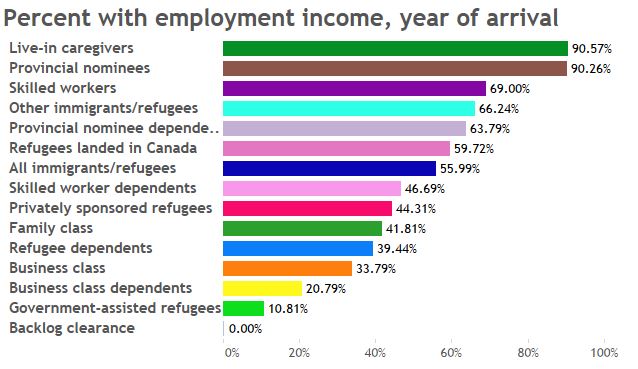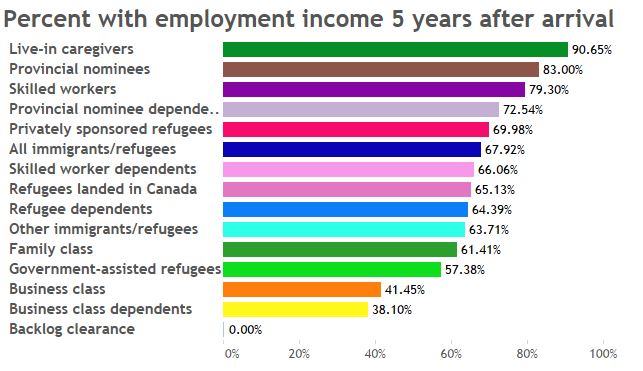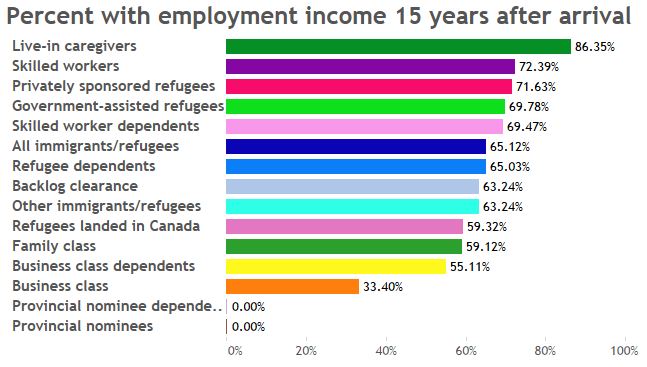Much of Canada’s conversation around refugees — whom do we take, when and how many? — has focused on the assumed cost of the initiative.

We’ve dissected some of the most common misconceptions around what refugees actually get in terms of assistance, and what they’re required to repay once they arrive in Canada.
READ MORE: No, Canada doesn’t spend more on refugees than on retirees
But what about the other side of the equation — how do refugees fare in the years and decades following their arrival?
Statistics Canada data analyzed by Global News shows how swiftly refugees and immigrants start working and earning once they become permanent residents.
The figures also indicate the way your entry to Canada can influence your financial trajectory afterward.
READ MORE: Some Canadian refugees are more equal than others
Within five years, 57 per cent of government-assisted refugees, 65 per cent of refugees who claim asylum once they’re in Canada and 70 per cent of privately sponsored refugees reported employment income.
(The figure for all Canadians in 2013 was about 73 per cent)
And the percentage of refugees earning employment income rises the longer they’re in Canada:
GALLERY: Click through to see the percentage of new Canadians with employment income in the years after they arrive
At the same time, newcomers’ reliance on government assistance decreases the longer they’re in Canada.
GALLERY: Click through to see how new Canadians’ use of government assistance changes in the years after they arrive
New Canadians’ median employment incomes also rise precipitously in the years following their arrival in Canada. Overwhelmingly, people who came to Canada in 1993 were earning more than the median Canadian by 2013. That includes refugee dependents and privately sponsored refugees.
(Canada’s median employment income in 2013 was $32,410.)
GALLERY: Click through to see how new Canadians’ employment earnings change in the years after they arrive
‘Selling citizenship at a really high price’
There’s one significant exception, however: “Business class” or “investor” immigrants who’d been in Canada 20 years reported the lowest employment income of any immigrant category in 2013.
They were also the least likely to report income, period: Only 26 per cent reported employment income on their tax forms.
Whether that’s the result of creative accounting or economic under-performance, it indicates just how poorly Canada’s attempt to lure high-spending businessmen panned out, says University of Ottawa professor Ravi Pendakur.
The program became, effectively, “a quarter-million-dollar fee for getting landed status.”
Or, Pendakur said, “selling citizenship at a really high price.”
“One thing that, at least in the past, that Canada has done really well is bring in a wide variety of people — different educations, different knowledge sets — and, by and large, people have done well.”
WATCH: Syrian refugees catching the flu

Newcomer network
It doesn’t matter where you’re from — people with connections do better, professionally.
Privately sponsored refugees tend to out-earn their government-sponsored counterparts, in part because their sponsors help ease their transition into Canadian life, says Jennifer Hyndman, director of York University’s Centre for Refugee Studies.
“There’s often a family reunification link — you have social capital,” she said.
But people who claim asylum once they’ve arrived in Canada — something the federal government discourages, especially over the past several years — also tend to do well.
That could be because they have the resources and wherewithal to make it to Canada on their own to begin with, Hyndman said.
“And they’re determined, obviously.”
Disparities between immigrant and refugee categories speak to the importance of linking government-assisted refugees with social and professional networks in their new communities. But government-assisted refugees are also going to be, by definition, the neediest and most vulnerable of Canada’s newcomers — the government hand-picks them with that in mind.
- ‘Shock and disbelief’ after Manitoba school trustee’s Indigenous comments
- Invasive strep: ‘Don’t wait’ to seek care, N.S. woman warns on long road to recovery
- Grocery code: How Ottawa has tried to get Loblaw, Walmart on board
- ‘Super lice’ are becoming more resistant to chemical shampoos. What to use instead
“That group, overall, has the greatest number of obstacles,” Hyndman said.
“It’s important that people are set up for success. And it requires investments. And I see income assistance as an investment.”
That said, the figures indicate Canadian newcomers of all backgrounds have been astonishingly resilient when it comes to putting down roots.
The data bear that out: In 2002 Canada implemented a new policy that made it easier for impoverished refugees to get in. You’d think having poorer people make up a larger proportion of newcomers, the total pool of new Canadians wouldn’t do as well financially.
Not so.
“Refugees coming in the 2000s were no worse off than people who came in the 1990s,” Hyndman said.
“Refugees are not just people who sit around.”
WATCH: Long-awaited reunion for Somali refugees and family in Winnipeg Thursday evening



































Comments